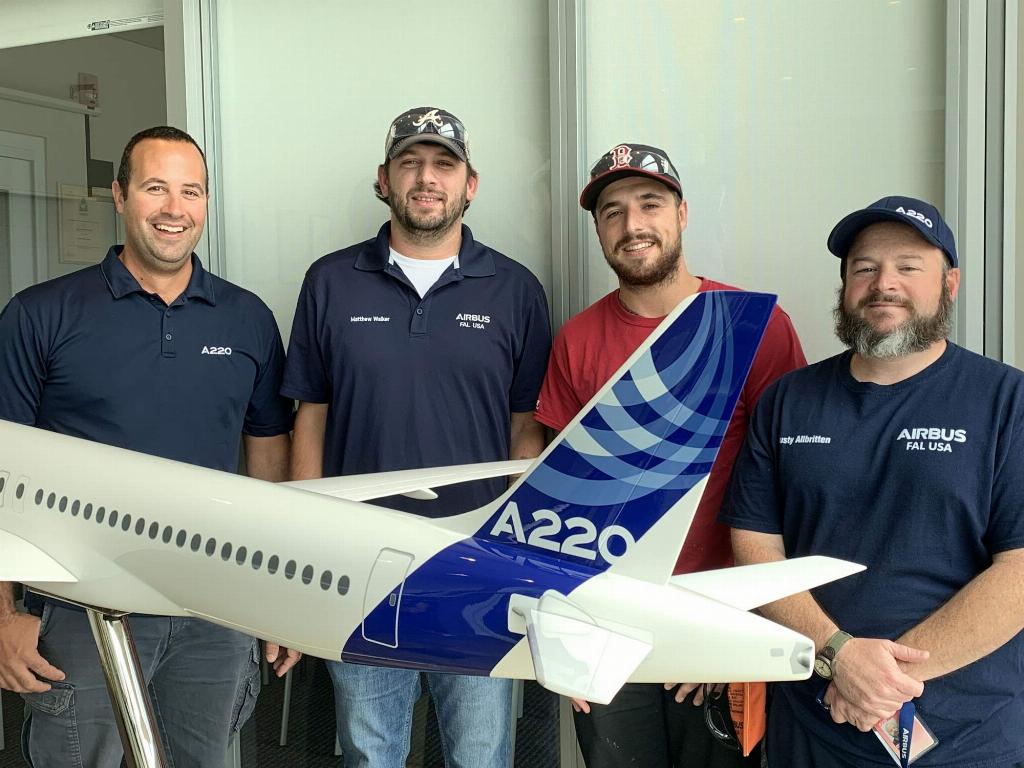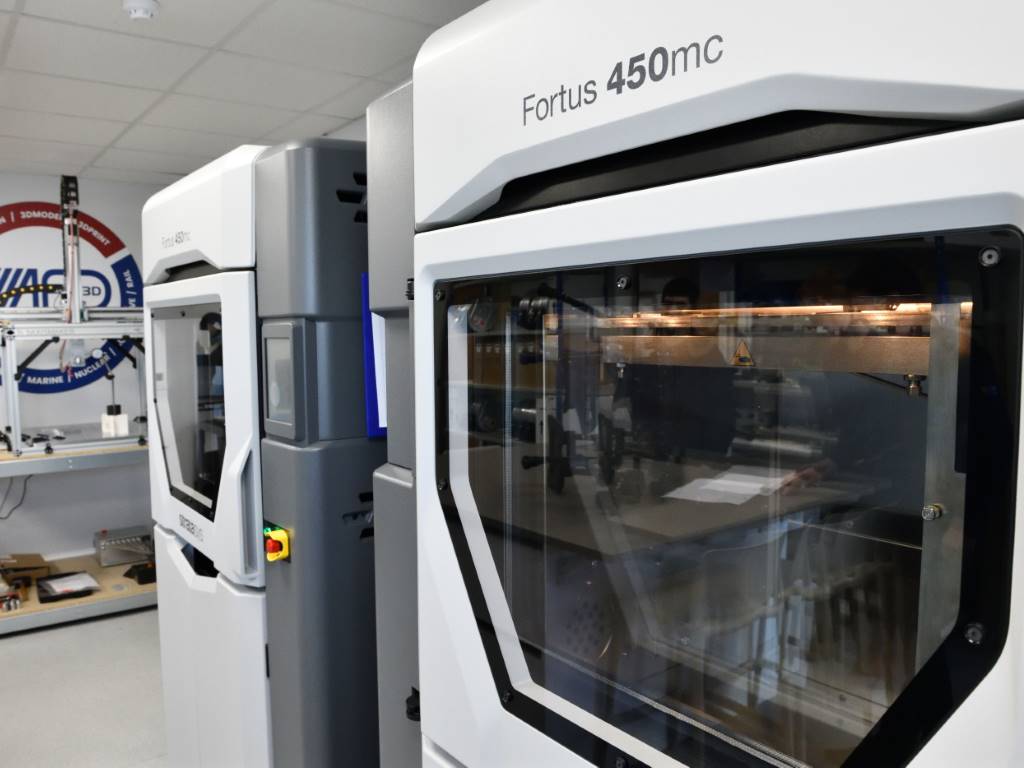An own goal?

Boeing and Airbus have invested in each other’s backyard, but now tariffs threaten to undermine the supply chain they both rely on. Rob Coppinger reports.
The Airbus A320 family aircraft and its new A220 model which the European firm partly makes in Mobile, Alabama will escape the billions of dollars’ worth of tariffs applied by the United States (US) government, but Boeing has no such investment in Europe and will be doubly hurt if a transatlantic trade war encompasses the supply chain.
Fifteen years ago, the US government initiated a complaint at the World Trade Organisation (WTO) against alleged subsidies for the European aircraft industry and from 18 October President Donald Trump’s administration began applying tariffs to a range of non-aviation European goods. In a statement, Boeing said: “Unfortunately, Airbus’s non-compliance will negatively impact European member states, industries, and businesses completely unrelated to Airbus’s actions, as well as Airbus’s airline customers.”
The WTO members had ruled on 14 October that the US could impose tariffs amounting to up to $7.4 billion annually; and Airbus models imported into the US will now carry a 10% tariff, but not those made in Mobile. Earlier in October the US Government had stated that its tariffs would be limited to, “10% on large civil aircraft and 25% on agricultural and other products.” The US started applying these tariffs to countries where Airbus is based on 18 October. The states are being targeted individually, not the European Union (EU) as a bloc, because this is a WTO dispute and France, Germany, Spain and the UK are all individual WTO members. The UK would not be saved from tariffs if it left the EU.

The last 15 years has seen victories and defeats for the US and the EU, with the WTO ruling for and against both parties. In response to the WTO decision, Airbus chief executive officer, Guillaume Faury, stated: “Airbus is… hopeful that the US and the EU will agree to find a negotiated solution before creating serious damage to the aviation industry as well as to trade relations and the global economy.” Airbus points out that almost 40% of Airbus’ aircraft-related procurement comes from US aerospace suppliers.
The EU has a counter claim which refers to tax relief for Boeing and its free access to NASA research facilities; and this is still going through the WTO complaints process. Last April, the WTO found Boeing to be in “non-compliance” regarding subsidies. The WTO’s dispute settlement board was to meet on 28 October. WTO members may rule in favour of the European giant in the months to come. The EU potentially could then apply billions of euros worth of tariffs to US made goods in 2020.
Today, the US tariffs do not include the aerospace supply chain, but they could. In April, the US government published its preliminary list of products to have import duties imposed on them and they included undercarriage components, fuselages and fuselage sections; along with fish produce, machinery, knives, binoculars and many other non-aviation goods. Any such tariffs would inevitably see costs rise for aircraft production. Almost €25bn in aircraft components are bought from hundreds of European suppliers by the US aerospace giant for its Boeing 737, Boeing 747, Boeing 767, Boeing 777 and Boeing 787 programmes.
Boeing backs Britain
Last year, Boeing opened what it describes as its, “high-tech production facility,” in Sheffield. It is the only Boeing production facility in Europe, and it produces actuation components for the 737 and 767 wing trailing edges. Asked if it intends to open another European facility, Boeing said: “We are always considering new opportunities for Boeing production.” Boeing has 5,500 employees in Europe, but it declined to disclose how many work on commercial aircraft because some employees also work across other areas of the business.

Boeing’s US suppliers also subcontract, or own, European firms. Spirit Aerostructures has been going through the process of buying Belgian firm Asco Industries this year. The EU gave permission for the acquisition in the first quarter. While this has been approved, in the light of the WTO decision, the EU could use its powers under world trade rules to strike back at the USA without involving the WTO directly.
On 4 October, the European Commission (EC) opened what it calls, “an in-depth investigation,” to assess the proposed joint ventures between Boeing and Brazilian aircraft manufacturer, Embraer. Boeing and Embraer’s plans, approved by the Brazilian firm’s shareholders in February this year, would see Embraer's commercial aircraft business operated very closely in conjunction with Boeing and they would also carry out, jointly, the marketing of Embraer’s KC-390 military aircraft.
Wise to rationalise?
The EC’s 4th October announcement about the Boeing, Embraer deal said: “The Commission is concerned that the transaction may reduce competition as regards commercial aircraft.” The EU Commissioner for competition policy, Margrethe Vestager, said in that statement: “we want to make sure that mergers in commercial aircraft do not significantly reduce effective competition on prices and product development.” The EC’s in-depth investigation will be completed by 20 February 2020.
Meanwhile, Airbus is investing in Canadian firm Bombardier's C Series, which was renamed the Airbus A220 in July last year. In 2017, Bombardier announced a partnership with Airbus to build and market the A220, including the construction of a production facility in Mobile; which became operational in August this year. The 14 October WTO announcement about the US tariffs states that the WTO’s Canadian delegation called on the US, “to show restraint,” declaring that the health of an increasingly integrated aircraft industry was at risk.
In Europe, trade analysts see potential problems for Boeing with the imposition of tariffs. In a September policy briefing, the German government funded Kiel Institute for the World Economy, said: “if the European Union itself takes countermeasures, for example in the WTO negotiations against Boeing, the US would lose more than Europe. This is particularly true because the US generates a trade surplus for large aircraft with the EU.” Next year could also see EU sanctions, once the WTO rules on the non-compliance it found in April this year are released.
Since Airbus started selling airliners in the 1970s, Boeing’s share of the world market has slowly shrunk to where the industry sees a tight race between the two companies for more than 50% of global sales. The US government and Boeing may have hoped that a WTO ruling against alleged European subsidies would see Airbus lose market share after its models became more expensive, but in the complicated world of supply chains and inward investment, Boeing may turn out to be more vulnerable to WTO action than it realised.













